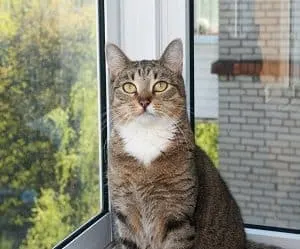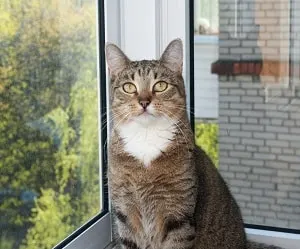 Most cat owners will never witness their cats “let it rip.” While it’s certainly possible for cats to pass gas, it’s not very noticeable. It doe happen though and it’s quite interesting. Most cats’ farts are silent and do not have a strong odor. For some owners you may be wondering, why does my cat fart so much?
Most cat owners will never witness their cats “let it rip.” While it’s certainly possible for cats to pass gas, it’s not very noticeable. It doe happen though and it’s quite interesting. Most cats’ farts are silent and do not have a strong odor. For some owners you may be wondering, why does my cat fart so much?
Cats pass frequent gas when their digestive system is disturbed by food or a sudden change in diet. If you observe that its gas has a particularly unbearable smell, then you should call your local veterinarian. Food allergies or specific health issues are to blame for your cat’s excessive farting.
There are several reasons that your cat could be passing frequent gas; most of them are not life-threatening. Once the cause is identified, it’s relatively easy to prevent your cat from further stinking up your home!
Is It Normal For Cats To Fart a Lot
It’s not normal for cats to fart a lot. However, cats can pass gas. Cats, like humans and dogs, possess the ability to fart as they swallow air when they eat. The air, or gas, travels into their digestive system, where it stays until it can be released from the body by a fart, burp, or breathing.
The bacteria living in the digestive tract also releases gas when helping to break down food. Once enough gas has built up, it needs to get out somehow. So, don’t blame your kitty if they let it out once in a while.
If you hear your cat farting in excess, you may be concerned, and understandably so. While you may be able to pinpoint the cause of your cats farting through internet research, it wouldn’t hurt to take your cat into the vet.
What Causes Excessive Gas In Cats
Most of the time, excessive gas in cats is caused by food allergies or an inadequate diet. Your kitty may have specific food sensitivities; their farting can be a clear sign that you need to immediately eliminate that food from their diet.
Additionally, cats who ingest too much fiber can experience stomach issues and, as a result, pass a ton of gas. Technically, cats are obligate carnivores and should be eating a diet composed of almost exclusively meat.
Traditional cat food, including wet foods, often contains soybeans, corn, wheat, and other ingredients that are high in fiber. Cats can’t adequately digest these high-carbohydrate and high-fiber ingredients; they should seldom be included in your cat’s daily feeding regimen.
Ending your cat’s frequent farting may require completely revamping your cat’s diet.
Further, processed dairy should never be given to your cat as a treat. If you’re providing your cat with a bowl of milk every so often, it could be causing your cat to fart.
Contrary to popular opinion, cats don’t have the enzyme needed to digest lactose adequately. Giving a cat pasteurized milk, wherein the enzyme lactase has been converted to lactose, almost always results in stomach upset.
Although it’s rare, your cat could be passing gas due to health problems, particularly intestinal parasites. If your cat shows other symptoms of intestinal parasites, such as vomiting, diarrhea, and foul-smelling gas, you should consult your veterinarian immediately. Usually, foul-smelling farts are a sign of an underlying health issue.
Does Wet Cat Food Cause Gas
Wet food can cause gas in cats. In fact, wet food is more likely to cause gas than dry food. When moving from dry food to wet food you may notice a more foul scent in your cat. This is because of dietary change. Any changes in eating habits can cause your cat to produce more gas than usual.
Any foods that contain grains or soy; even wheat are going to cause your cat to be gassy. Dairy products are big contributions to gas in cats, which is why you may feel wet food causes more gas than dry ingredients.
When dealing with wet food, it’s especially important to check the expiration dates on the can. Food that is past the expiration date or spoiled is going to cause serious digestive issues for your cat. Cans that have been dented are also more susceptible to bacteria.
Do Cats Fart When They Are Scared
In addition to food and diet being the main contributor to gas in cats, there is also the element of fear. Yes, cats can fart when they are scared, although it’s not the most common thing. Cats who are spooked can do all sorts of things you would not expect. Urinating, gas, even using the bathroom on themselves is possible.
Although cats can have gas when they are scared, you may not even notice when this happens. The smell is mostly odorless. There are a few cats who break this mold though, and the smell that they leave behind will surely be rancid, but it may not be audible.
When To Be Concerned About Your Cat Farting
If you have a particularly gassy cat, you might start to have some concerns. Here are a couple of things you should specifically look for when your cat is having gas:
- Diarrhea
- Vomiting
- Excessive Gas
- Lack Of Appetite
Pay special attention to each of these, especially the lack of an appetite combined with vomiting.
How To Prevent Farting In Cats
If you want to help your cat fart less there are a few simple changes you make to their lifestyle. Make sure you’re cat is eating a low-fiber diet. Fewer fibers help with the better passage and easier digestion in cats.
The next thing you can do to help prevent farting in your cat is to feed smaller meals. Sometimes a cat can have trouble digesting large amounts of food. So, the logical thing to do is to feed more frequently and in small amounts. An automatic feeder that you can put on a timer and set the volume of dispensed food can help greatly here.
What Is The Best Cat Food For Gassy Cats
If you’d call your cat gassy, you’ll want to begin feeding it foods that are easier on its digestive system. This process entails abandoning its current feeding regimen.
Many vets recommend wet or dry cat foods that do not contain common irritating ingredients, such as grains.
If you feed your cats mainly dry food, try out Blue Buffalo Natural Veterinary Diet GI Gastrointestinal Support Grain-Free Dry Cat Food. It’s free of grains and hard-to-digest ingredients while containing prebiotic fibers to promote a healthy digestive tract. Blue Buffalo also offers a canned food alternative.
Hill’s Pet, a brand favored by vets across the nation, offers Prescription Diet Digestive Care as both canned food and dry food. Hill’s Pet is very transparent about their ingredients and how those ingredients will benefit your cat. They claim that their Prescription Diet will help improve digestion and stool quality.
You may also consider feeding your kitty exclusively raw foods, including muscle tissue, secreting organs, and bones. If your cat eats a complete and balanced diet, it shouldn’t experience any digestive issues—especially if it is modeled off of what they would normally eat in the wild.
There are several subscription services that offer raw food, including We Feed Raw. They claim that raw foods not only promote healthy digestion and weight but also reduce flatulence!
Final Thoughts
There are many steps you’ll need to take to soothe your cat’s digestive system. While a gassy cat is usually nothing to lose sleep over, it would be unfair to your kitty to ignore their frequent flatulence instead of searching for the root of the problem.

My name is James, and welcome to FAQCats!
Along with our team of cat owners, expert pet enthusiasts, and pet professionals, we aim to write engaging helpful, engaging content about cats. At FAQCats we strive to provide content that’s accurate and fun to read. Our team writes about everything related to cats; even the most complex of topics. Through extensive research and caring for our own fur-pals, we’re able to provide something cat owners worldwide will love. Have a look around, and leave us feedback anytime!

